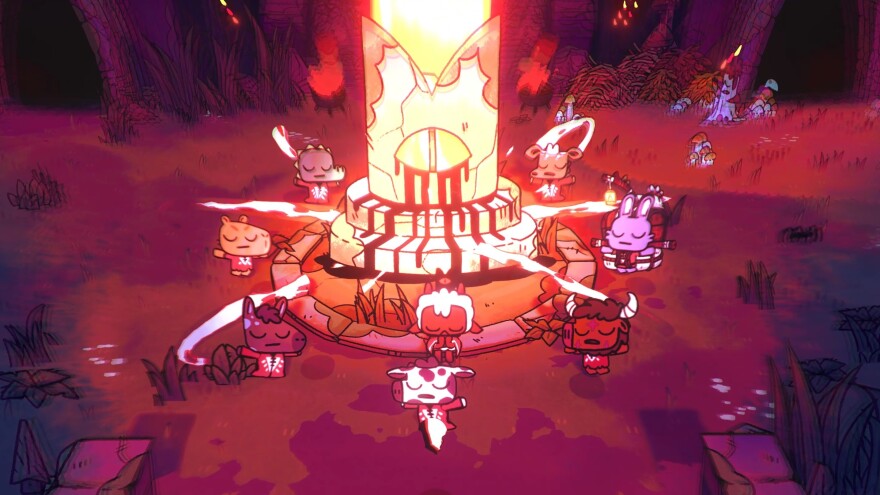For movies, there are the Oscars. For music, the Grammys. For television, the Emmys. And for video games, The Game Awards.
They're the brainchild of Geoff Keighley, a video game journalist and television presenter. He got his start as a young teen in Canada, writing articles about games online. He also wrote for Cybermania '94, the first televised awards show for video and computer games, and attended the event at Universal Studios Hollywood.
"It made such an impression on me to be in this room where people were celebrating video games and everybody coming together to celebrate this thing that I had really just loved in my bedroom at home in Canada."
The experience would plant the seed for The Game Awards.
"I've really been on this 30-year journey since then to try and create something that celebrates games in the right way," he said. "They are the biggest, most powerful form of entertainment in the world."
He spoke with NPR about the video games that defined 2022, the changing industry and his hopes for the future of The Game Awards.
Interview Highlights
On the games that defined 2022
2022 was a really interesting year for the gaming industry. There were a lot of big releases early in the year, and they got a little bit quiet but just picked up recently with the release of God of War Ragnarök, which is an incredible game for PlayStation. [It's] the sequel to the game that won "Game of the Year" in 2018, God of War.
The other big game that everyone's really talking about is Elden Ring. It came out in February. It's based on a world created by George R.R. Martin and made by FromSoftware, a Japanese studio that's known for really hardcore, intense role playing games. So those are two of the sort of big flagship games.
But there's also fun stuff in the show and fun games that have come out like Stray where you play a cat and that's up for Game of the Year. And then there's Xenoblade Chronicles, which is a big Nintendo game that got nominated. And there's another indie game called Cult of the Lamb, which is about a crazy little lamb that goes around fighting with a sword. So, you know, what's fun about games is that there's always something new every year.

On finding a balance between creating an entertaining show while also promoting new and upcoming games
What we're really showing people is a preview of where the industry is headed next and hopefully there's an excitement to it similar to like, you know, when you go to the movies, you get excited about the trailers, right? And you're being marketed to, but you're excited to see that content. So yes, there actually is a kind of commercial aspect to our show, but we actually that drives a lot of viewership. I just did a poll last week on Twitter and most of the fans say what really excites me about the show are the world premieres. And they also, you know, get to see the awards as part of that.
It's a careful balance. I think it's something unique about our show, and it's part of the reason for our success. But to your point, you know, we are called The Game Awards, so we want to make sure awards are a key piece of the experience as well.
On the way video games now receive more critical acclaim and mainstream attention than they once did – and being part of that shift
It's heartening in a way, because when I started out, I remember applying to colleges back in the day and I'd write about video games and people wouldn't – they'd call and ask for clarification on my application. Like, "what's this CD-ROM thing that you're writing about? We don't know what this is." You know, people didn't really appreciate or understand the industry, and I think over the past few decades, there's been increasing acceptance of games as a valid form of entertainment and really rich, interesting storytelling, progressive technology and narratives. It's heartening to me to see that there's been an acceptance of the power of this medium. And it's made our job easier in some ways to sort of do a show like this.

But I still think the gaming industry faces a little bit of an identity crisis. People still talk about the Oscars and the Grammys in a different way than The Game Awards. And I think it's changing, but there's still a lot of work to be done.
On his hopes for the future of The Game Awards
My goal when I started the show was to build the world's largest award show that happened to be about video games. You know, people always joke about EGOT, right, where a talent will get, you know, an Emmy, a Grammy, an Oscar and a Tony. And I always, you know, I hope we'll eventually grow to be ... where Game Awards is in the mix on that. The idea that we are one of those shows that is seen as being one of the most important recognition for an industry - and in the same conversation as all those other major awards shows. So that's where I think we're on a path to getting there, and I hope we continue to grow and expand in that direction.
Copyright 2022 NPR. To see more, visit https://www.npr.org.



